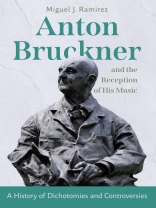A bold, deeply researched, and long-needed debunking of the platitudes and prejudices that have long clouded our view of the personality and compositional habits of Anton Bruckner.
Bruckner was, and continues to be, among the most divisive figures in the history of nineteenth-century music, in large part owing to the complexities and contradictions of his personality and the amalgam of differing stylistic features that characterize his musical language. Miguel J. Ramirez’s insightful book scrutinizes the stereotypes about Bruckner’s personality that loom large in the public imagination, the controversial editorial policies behind the publication of his collected works, and the trends in the reception of his music that were set early on by a handful of Viennese journalists.
Working to undo the platitudes and prejudices that cloud our view of Bruckner’s true personality and compositional habits, this study debunks the entrenched misconception that he was a helpless victim of ‘the Viennese press’-a notion contradicted by the pugnacious exchange in which pro- and anti-Bruckner critics invariably engaged after the premiere of each of his works. Ramirez demonstrates that, from the mid 1880s onward, only Eduard Hanslick, Max Kalbeck, and a few other critics persisted in their opposition to the Brucknerian symphonic oeuvre and that their caustic and denigrating reviews were vastly outnumbered by those of more appreciative critics who heard what performers and listeners cherish now: the music’s coherence, grandeur, and emotional sweep.
表中的内容
List of Musical Examples
Note on Access to the Periodical Literature Cited
Acknowledgments
Introduction
Part I: Perceptions of Bruckner’s Personality
Chapter 1. Bruckner’s History: History’s Bruckner
Of Candles and Flames
Of Platitudes and Psychograms
Of Biographies and Hagiographies
Chapter 2. A History of Controversies
The Transmission of Bruckner’s Music
The IBG and the ‘Regensburg Walpurgis Night’
Part II: Viennese Reception of Bruckner’s Music
Chapter 3. Early Reception, ca. 1873-1885
‘A Sort of Dictatorship Over Public Opinion’: Feuilletonism vs Music Criticism
‘At the End of All Music’: Early Works and The Second Symphony
‘An Unforgettable, Heart-Wrenching Moment’: The Third Symphony
‘A Musical Civil War Broke Out’: The Fourth Symphony and the F-Minor Mass
‘Bruckner Can No Longer be Ignored’: The Sixth Symphony and the String Quintet
Chapter 4. Mid Reception, ca. 1885-1892
‘The Pinnacle of Symphonic Creation’: The Seventh Symphony in Germany
‘The Time Is Near’: The Te Deum and the Seventh Symphony in Austria
‘Malicious and Subjective Criticism’: 1890 Performance of the Third Symphony
‘Imbued with the Seal of Brilliance’: Other Works Performed in the 1890s
Chapter 5. Late and Posthumous Reception, ca. 1892-1924
‘A Total Victory of Light Over Darkness’: The Eighth Symphony and the Late Reception
‘Bruckner Is A Simple Being’: Schenker’s Reception of Bruckner
‘Already Blessed with A Monument!’: Posthumous Reception of Bruckner
Conclusion: Myths and Fallacies
Of Opponents and Enemies
Of Unbildung and Formlessness
Bibliography
Index
关于作者
MIGUEL J. RAMIREZ is an independent scholar and musician whose research interests include Austro-German music and culture in the nineteenth century, neo-Riemannian theory, and the cultural links between Germany and Latin America during the Third Reich.












